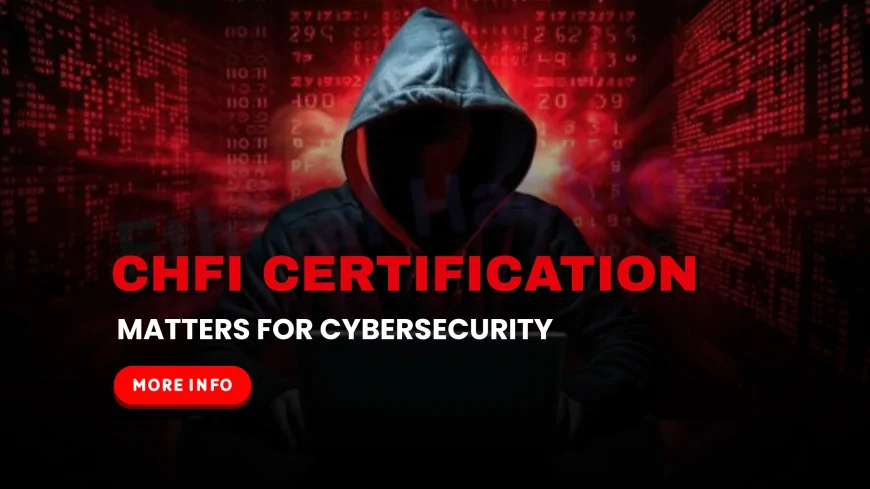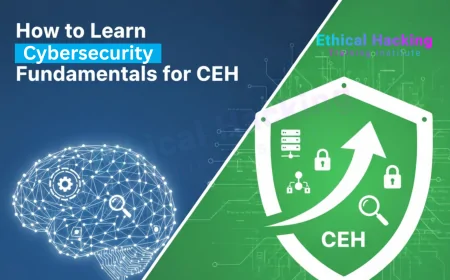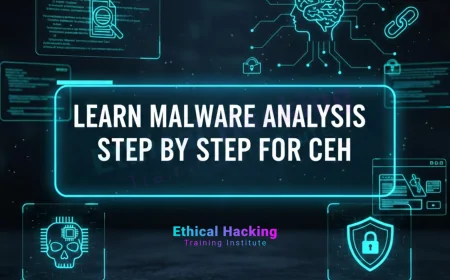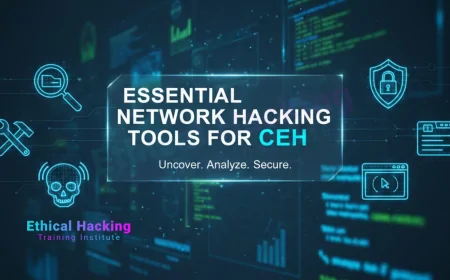Computer Forensic Investigator Certification: Why It’s a Must for Your Cybersecurity Career | Cybersecurity Career Boost: The Value of a Computer Forensic Investigator Certification
Discover why Computer Forensic Investigator Certification is essential for a cybersecurity career. Learn top certifications, tools, job roles, skills, salaries, and FAQs in this complete guide.

Table of Contents
- Introduction
- What is Computer Forensics?
- Importance of Computer Forensic Investigator Certification
- Top Certifications to Consider
- Skills You Gain from Certification
- Essential Tools You Will Learn
- Career Benefits of Being Certified
- Job Roles and Salaries
- How to Prepare for a Forensic Certification
- FAQs
- Conclusion
Introduction
In an age where data breaches, digital fraud, and cybercrimes are escalating rapidly, computer forensics has become a vital component of cybersecurity. If you're serious about a long-term, successful cybersecurity career, earning a Computer Forensic Investigator Certification can be one of the smartest moves you make. This certification demonstrates your expertise in uncovering, analyzing, and presenting digital evidence legally and accurately. Whether you're aiming for a job in law enforcement, corporate security, or digital consultancy, becoming a certified forensic investigator opens doors to high-demand roles and elevated salaries.
What is Computer Forensics?
Computer forensics is the science of collecting, analyzing, and preserving digital evidence in a legally acceptable manner. It plays a pivotal role in criminal investigations, data breaches, insider threats, and compliance audits. A forensic investigator uses specialized techniques to track down data from computers, servers, mobile devices, and networks without altering the original evidence. They present this information in a way that's admissible in court or internal investigations.
Importance of Computer Forensic Investigator Certification
With increasing reliance on digital systems and the rise in cyber incidents, organizations need professionals who can investigate and secure digital assets. Certification in this domain validates your competence and gives you a competitive edge. Here's why it's essential:
- Professional Trust: This certification demonstrates your expertise and integrity in the cybersecurity field.
- Compliance: Supports alignment with global regulations like HIPAA, GDPR, PCI-DSS, and ISO 27001.
- Legal Expertise: Enables you to handle evidence without making it inadmissible.
- Employer Confidence: Certified professionals are trusted to manage sensitive digital investigations.
Top Certifications to Consider
Several globally recognized certifications can help launch or upgrade your computer forensics career. Here are the top ones:
- CHFI (Computer Hacking Forensic Investigator) – EC-Council: One of the most popular certifications covering tools, investigation techniques, and reporting.
- GCFA (GIAC Certified Forensic Analyst) – : Designed for cybersecurity experts focused on intrusion analysis, threat hunting, and evidence preservation.
- CFCE (Certified Forensic Computer Examiner) – IACIS: Highly valued among police departments and investigative agencies for digital evidence analysis.
- EnCE (EnCase Certified Examiner): Tailored for professionals using EnCase tools for forensic analysis.
- Certified Computer Examiner (CCE) – Designed to validate expertise in evidence preservation, imaging techniques, and forensic analysis tools.
Skills You Gain from Certification
A computer forensic certification is not just a badge—it's an entire skillset that includes:
- Recovering deleted or encrypted files
- Imaging and cloning digital devices
- Maintaining chain-of-custody procedures
- Performing timeline analysis and user activity review
- Understanding file systems (FAT, NTFS, EXT)
- Legal procedures and documentation
Essential Tools You Will Learn
Certifications will expose you to industry-standard tools such as:
- EnCase Forensic – Widely used in law enforcement for evidence acquisition
- FTK (Forensic Toolkit) – Specializes in detailed investigation of emails, files, and metadata for digital forensics professionals.
- Autopsy/Sleuth Kit – Widely used in open-source forensics for file carving, recovery, and system analysis.
- X-Ways – Known for its speed and efficiency in digital forensics, without compromising on capability.
- Wireshark – For packet analysis in network forensics
Career Benefits of Being Certified
Earning a Computer Forensic Investigator Certification can lead to:
- Better job opportunities in both public and private sectors
- Faster career progression with leadership roles in cybersecurity teams
- Attractive salary packages
- Qualifies you for cross-border forensic work and roles within law enforcement agencies.
Job Roles and Salaries
From corporate security teams to investigative agencies, the demand for certified forensic talent continues to rise. Some of the top job roles include:
- Digital Forensic Analyst
- Cybercrime Investigator
- Incident Response Specialist
- Cybersecurity Consultant
- Fraud Examiner
According to industry reports:
- Entry-level: ₹4 LPA – ₹7 LPA (India) / $60,000 – $80,000 (US)
- Mid-level: ₹8 LPA – ₹15 LPA (India) / $90,000 – $110,000 (US)
- Senior-level: ₹18 LPA+ / $120,000 – $160,000 (US)
How to Prepare for a Forensic Certification
Preparation is key to success in any forensic certification exam. Here are expert tips:
- Choose the Right Certification: Pick one based on your current role and career goals.
- Use Official Study Guides: Always use vendor-approved books and manuals.
- Hands-On Practice: Set up a virtual lab using tools like Autopsy, Kali Linux, and FTK Imager.
- Take Mock Exams: Simulate real exam conditions to manage time better.
- Join Communities: Forums like Reddit, Discord groups, and LinkedIn communities offer peer support.
Frequently Asked Questions (FAQs)
1. What is a Computer Forensic Investigator?
A Computer Forensic Investigator is a cybersecurity expert who examines digital systems and devices to recover, preserve, and analyze data, often for use in legal proceedings or corporate investigations.
2. Why is certification important in computer forensics?
Certification validates your technical skills and legal knowledge, proving that you're capable of handling sensitive data and investigations in a professional and admissible manner.
3. Which certification is best for starting a career in computer forensics?
The CHFI (Computer Hacking Forensic Investigator) certification by EC-Council is highly recommended for beginners due to its comprehensive and practical approach.
4. How long does it take to become a certified forensic investigator?
Depending on the certification and your experience, it usually takes 3 to 6 months of preparation and training to earn a certification.
5. Can I get certified in computer forensics online?
Yes, most leading certifications like CHFI, GCFA, and EnCE offer online training programs and exam options for global accessibility.
6. Is coding knowledge necessary for digital forensics?
While not mandatory, basic scripting or programming knowledge (Python, PowerShell, Bash) can greatly enhance your effectiveness in forensic analysis.
7. What industries hire forensic investigators?
Industries include government agencies, law enforcement, banking, IT services, consulting firms, and cybersecurity companies.
8. What is the average salary of a certified forensic investigator?
Salaries range from ₹4 to ₹18+ LPA in India and $60,000 to $150,000 in the US, depending on experience and certification.
9. What are the key skills required for digital forensics?
Skills include data recovery, evidence preservation, knowledge of file systems, legal documentation, and use of forensic tools like EnCase, FTK, and Autopsy.
10. Which are the most used tools in computer forensics?
Popular tools include EnCase, FTK, Autopsy, Sleuth Kit, X-Ways Forensics, and Wireshark for network forensics.
11. What’s the difference between CHFI and CEH certifications?
CHFI focuses on digital evidence collection and forensic procedures, while CEH (Certified Ethical Hacker) emphasizes penetration testing and ethical hacking techniques.
12. Can fresh graduates become forensic investigators?
Yes, many entry-level roles are available for certified graduates who demonstrate practical knowledge and have completed hands-on lab training.
13. What are the responsibilities of a forensic investigator?
Responsibilities include acquiring digital evidence, analyzing logs and systems, preparing reports, and testifying in court if needed.
14. Do I need a degree to become certified?
A degree is helpful but not mandatory. Certifications like CHFI and GCFA are open to professionals with relevant work or technical experience.
15. Are there any free resources for learning computer forensics?
Yes, platforms like Autopsy, SANS Cyber Aces, TryHackMe, and online communities offer free labs, guides, and tools for practice.
16. Is digital forensics useful outside of criminal investigations?
Yes, it is widely used in internal corporate investigations, data breaches, HR misconduct cases, compliance checks, and fraud analysis.
17. Do certifications need renewal?
Yes, most certifications require renewal every 2–3 years, often through Continuing Education Credits (CECs) or re-examinations.
18. What is the CHFI exam format?
The CHFI exam includes 150 multiple-choice questions to be answered in 4 hours, covering digital evidence, investigation techniques, and forensic tools.
19. Can I work as a freelance forensic investigator?
Yes, many professionals offer freelance services in legal consulting, digital audits, or as expert witnesses after gaining sufficient experience and certification.
20. Are forensic certifications recognized globally?
Certifications from EC-Council, GIAC, IACIS, and others are globally recognized and respected across private, public, and law enforcement sectors.
Conclusion
The demand for certified computer forensic investigators is on the rise, and organizations are actively looking for professionals who can protect their digital frontiers. By earning a recognized certification like CHFI or GCFA, you not only boost your resume but also gain practical skills and legal awareness needed to handle real-world cyber threats. Whether you're just starting in cybersecurity or looking to specialize, a Computer Forensic Investigator Certification is a must-have in your toolkit for a future-proof career.
What's Your Reaction?
 Like
0
Like
0
 Dislike
0
Dislike
0
 Love
0
Love
0
 Funny
0
Funny
0
 Angry
0
Angry
0
 Sad
0
Sad
0
 Wow
0
Wow
0


















